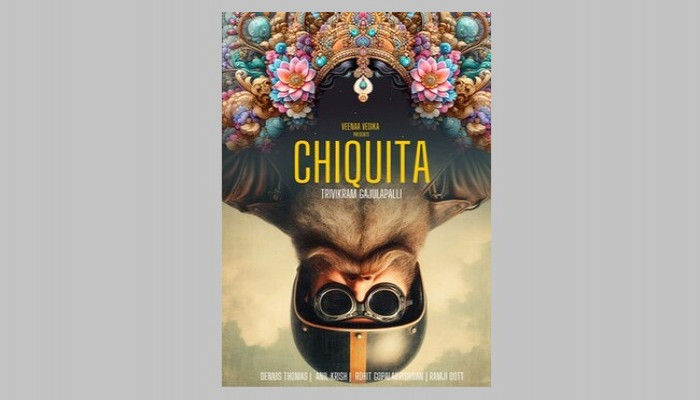Trivikram Gajulapalli’s ‘Chiquita’ Takes You on a Journey to Self-Discovery
- In Movie Reviews
- 10:22 AM, Oct 10, 2025
- Dr. Nidhi Shendurnikar
A sixty-year-old Texas-based biker, mountainous landscape, a family in conflict, a painful separation, heartfelt conversations, and a deep dive into eastern religion and philosophy from a westerner’s perspective -- Veenaa Vedika Productions’ ‘Chiquita’ is an endearing tale that holds your head and heart for close to an hour. The story revolves around Charles, who lives with his wife and is passionate about biking and freedom. Life changes forever when Charles undergoes a traumatic divorce, ending his thirty-year marriage, leaving him alone to deal with the vagaries of the world. Broken and devastated, a near-fatal accident leads him to encounter a ‘higher power’ in the form of the ‘Devi’ to whom he surrenders unconditionally to experience peace and light.
‘Chiquita’ is not a film merely about an individual’s rediscovery of himself; it is a subtle portrayal of the essence and depth of human relationships. In today’s times of fragility and uncertainty, the film’s narrative emphasises the beauty of the father-daughter, grandfather-granddaughter, neighbourly camaraderie and the bond that one shares with oneself. The message that for each one of us, the road to self-discovery is different and that only we can determine what path we follow rings loud and clear in each of the film’s frames. The worlds inhabited by Charles and Chiquita are distinct, signifying a contrast between eastern and western cultures, and yet the viewer is made to appreciate the art of navigating between two opposing worldviews.
The film’s first half focuses on building a context for Charles’ personality, his life, his troubled relationship with his wife and daughter on the one hand and his love for travelling, biking, meeting people and exploring nature on the other. He is shown to be a free-spirited, outspoken person going about life in a routine manner until tragedy strikes. The second half follows his inner journey of regaining confidence in himself through belief in ‘parashakti’, mending the bond he shares with his daughter, but without losing his faith and ideals in the process. Biking and ‘Devi Bhakti’ are central to Charles’ existence as he recovers from a heartbreaking phase of life.
Throughout the film, we see Charles as someone who carries immense respect for others’ values and opinions. Whether it is stacking away pagan idols in the attic to not invite the displeasure of his conservative Christian son-in-law (Joel) or to honour his daughter’s (Anna) belief in a particular way of prayer before meals, Charles’ actions convey a sentiment of mutual respect for religious, spiritual beliefs that may be different from what one has faith in. At the same time, he does not believe in imposing his ideas on his granddaughter (Olivia). He encourages her to question and disbelieve, a practice that is fast shrinking in present times. Charles and Anna both ultimately cultivate a sense of respect for each other’s beliefs. The profound conversation between the father-daughter duo, where Anna understands Charles’s embrace of the ‘parashakti’ philosophy, is the high point of the film. ‘Chiquita’ attempts to underscore the power of prayer, gratitude, acceptance, mutual respect and devotional surrender.
Charles’ life trajectory and encounter with the supreme force show that anyone can be the chosen one irrespective of colour, creed, gender, nationality and faith. One has to simply “be open to receiving the Devi’s blessings and light” which Charles is as a “Devi Upasak” (a worshipper of the Divine Mother). The divine in any form is a source of strength and ‘Chiquita’s’ visions help Charles express his innermost feelings and vulnerabilities, which he had otherwise hidden from the world for a long. Through Charles, the viewer acknowledges that the ultimate purpose and lesson of human life is the unity of the self and the world (Isha Upanishad), the presence of the divine in every individual (Shvetashvatara Upanishad) and supreme knowledge (Kena Upanishad).
The background music of the film transports the viewer to a different world where one is deeply immersed in the tradition of ‘bhakti’ and ‘yoga’. Mantras in the background, visual imagery of idols inside Charles’ house, chanting of prayers and manifestation of the ‘Devi’ first in the form of a little girl and then as Olivia is powerful and leaves a lasting impact. The positive impact of ‘dhyaan’ (meditation) has also been effectively portrayed. All characters in the film are well etched and contribute to the progress of the narrative.
For instance, Charles’ neighbour (Freya), a young woman who manages both studies and work, comes across initially as a carefree, no-nonsense lady but is someone who is deeply intelligent, sensitive and responsible, especially in her understanding of what ‘Chiquita’ means to Charles. The film does well to introduce and cultivate appreciation for indigenous beliefs and knowledge systems among a broad spectrum of audiences.
The film is a sincere endeavour to unravel the complexities of life and compels the viewer to look inward and find meaning in nature, human bonding, and to forge a meaningful connection with the divine supreme. However, Eastern philosophy and religions have several layers. They are complex systems in themselves, developed over thousands of years, inheriting a vibrant civilisational and cultural legacy. The director could have delved deeper into the principles of eastern religions, particularly Sanatana Dharma and explored its relevance not just for individual beings but also for the world at large. There is little attempt in the narrative to uncover the fundamental dichotomy between Western and Eastern civilisations and how they are opposing in their worldviews on many important aspects of life. This would have provided the viewer with deeper insights about the future of the civilised world, given the current state of uncertainty, one-upmanship and global conflict. The viewer would be interested in understanding what drew Charles to Paganism and why Devi worship made sense to him, in a rather elaborate way.
Many moments in the film require the viewer to put on their thinking caps and reflect on deeper questions about life and human existence. When Charles says, “that crash signalled a reset” – one is taken back to those moments of life which ensured a turnaround. Olivia’s observation about “doing the right thing” when she asks Charles to come and stay with them conveys the sensibilities and emotions of a young child who also understands the difference between ‘right’ and ‘wrong’. Charles’ admission of how the ‘Parashakti’ has brought wholesomeness and balance to his life is quite telling of the qualities of femininity that were lacking in his life before. Anna’s guilt for not being there for her father is relatable to the situation of many young adults today who leave their parents behind and get busy with their lives and careers. Many such scenes in the film speak directly to the audience.
Through Charles and ‘Chiquita’, who is none other than the ‘Devi’ herself, one realises how a single moment of ‘Bhakti’ can transform a person’s life, can show the right path and answer all questions unanswered thus far. ‘Chiquita’ leaves with you an important question that each one of us may try and answer – “How do you reach something that looks like it's right there, but it actually isn’t?”







Comments